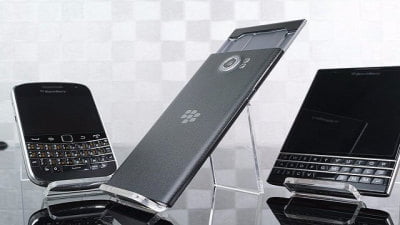- Licensing the secure Android OS over to OEMs would significantly reduce BlackBerry’s financial risk.
- However, it would also open up a security loophole for the security-focussed company.
- Investors and end-users need to take a hard look at BlackBerry.

Flickr
It looks like BlackBerry’s(NSDQ:BBRY) turnaround efforts are picking up pace. The beleaguered Enterprise solutions provider recently announced that it would exit the hardware business, and hand over the task of sourcing, developing and distributing its handsets to an entity called BB Merah Putih. It’s basically a joint venture between BlackBerry and several hardware companies, led by PT Typhone of Indonesia. It certainly sounds like an interesting move but what does it mean for BlackBerry from an operational standpoint? Let’s take a closer look.
Contents
The Big Plan
Let me start by saying that when BlackBerry designed, developed and distributed its own hardware, like DTEK 50, Priv, Passport, Z30 amongst many, it was exposed to various kinds of production, inventory, distribution and procurement risks. For starters, you could end up producing more devices than needed and face write-offs later-on due to depreciation-driven non-cash expenses, or there could be a hurdle in the procurement of parts that could ultimately delay the release of handset, or an entire batch of smartphones could come out faulty and force the OEM to initiate a major recall. The point that I’m trying to make here is that hardware production has several layers of risk factors attached to it.
So, the joint venture named BB Merah Putih was formed to de-risk BlackBerry’s operations. As per the deal, BlackBerry will hand over the designing, developing, manufacturing and distributing of BlackBerry-branded handsets over to a group of Indonesian smartphone manufacturers. It will also license it’s secured version of Android, as found in Priv and DTEK50, to these third party OEMs. And in exchange, BlackBerry would receive a flat-rate royalty fee from the sale of each of its branded devices in the country.
So, this move essentially eliminates most kinds of hardware-related manufacturing risks for BlackBerry. In addition, the EMM software provider’s working capital requirements should be reduced significantly as it won’t have to procure parts, stock up on inventory and wait for hardware-driven receivables from its channel partners. It’s basically a shift to an asset-light model where BlackBerry gets to focus on the software side of things, such as BES12, BB10, monetizing BBM and Hub apps, while OEMs worry about the hardware.
But like all things, this move also has a few downsides to it, which BlackBerry would have to address.
The Catch-22 Situation
First of all, we have to understand that there would be two layers of royalties involved in this deal. First, BlackBerry is charging a fee for licensing its Secure-Android version to OEMs. Then, Alphabet’s (NSDQ:GOOGL) Google would also need a royalty cut for letting these OEMs use its Play Store and Google Services apps. The payments to Google would have to be borne either by OEMs or BlackBerry.
If BlackBerry is licensing the fortified Android OS at cost, and not adding an additional layer of profit on top of Google’s royalty fee, then this arrangement won’t boost the beleaguered-smartphone maker’s revenues by any means. BlackBerry would be simply collecting checks from OEMs and handing them over to Google.
Also Read: BlackBerry Stock: Why The Tesla Motors Inc Hack Is Great News For BlackBerry Ltd (BBRY)
On the other hand, if BlackBerry is adding a layer of profit on top of Google’s licensing fee, then there’s a new problem. OEMs would be shelling out more licensing fees for BlackBerry’s Android than they would by producing regular versions of Android as licensed by Google. And how would they recoup these lost profits? Simple, by charging more for their devices.
I believe this would lead to the same kind of a problem again. The BlackBerry Priv was priced at an exorbitant premium and it turned out to be an absolute disaster in terms of sales. I suspect the same could happen to BB Merah Putih if its devices are priced at a premium as well.
The Limitations
That’s not it. BlackBerry is renowned for its mobile security. We may be able to recall hacking-related incidents on Android and iOS platforms but seldom do we hear anything of this sort on BlackBerry’s platforms. Plus, its devices are used by various international governments across the globe. So we can’t dispute BlackBerry’s prowess in the field of mobile security, and the reputation it has built around it.
But there’s one critical problem with BB Merah Putih. It involves licensing the OS to third party OEMs. What this essentially means is that BlackBerry would be handing out the code of its Secure-Android OS, over to not one, but several third party handset manufacturers. So safeguarding this code could become an issue.
Also Read: BlackBerry Stock: BlackBerry Ltd (BBRY) Might Have Found Its Next Growth Driver
There would now be multiple parties having access to this code, which was earlier stored safely with BlackBerry only. So the probability of this code falling into the wrong hands increases dramatically with the licensing move. Let’s say, in an unfortunate event, the bad guys exploit this security loophole and create some kind of security-related problems, what would it do?
BlackBerry’s reputation of being one of the most-secure mobile OS provider would be at risk. So this is one critical aspect that BBRY shareholders and security-focused end-users need to be aware of.
Putting It All Together
Licensing the secure Android OS looks like a good move for BlackBerry from a financial standpoint. It significantly reduces its manufacturing risk and working capital requirements, and allows the smartphone vendor to dedicate its limited resources towards the development of its software products.
But it also opens up a new set of challenges for BlackBerry. We don’t know when the devices will be available yet, and we don’t know if any OEM would want to license its near-dead BB10 OS either. And then there’s the risk of its code falling into the wrong hands. So investors need to take a long hard look at BlackBerry Stock.
[Source:-Amigo Bulls]




